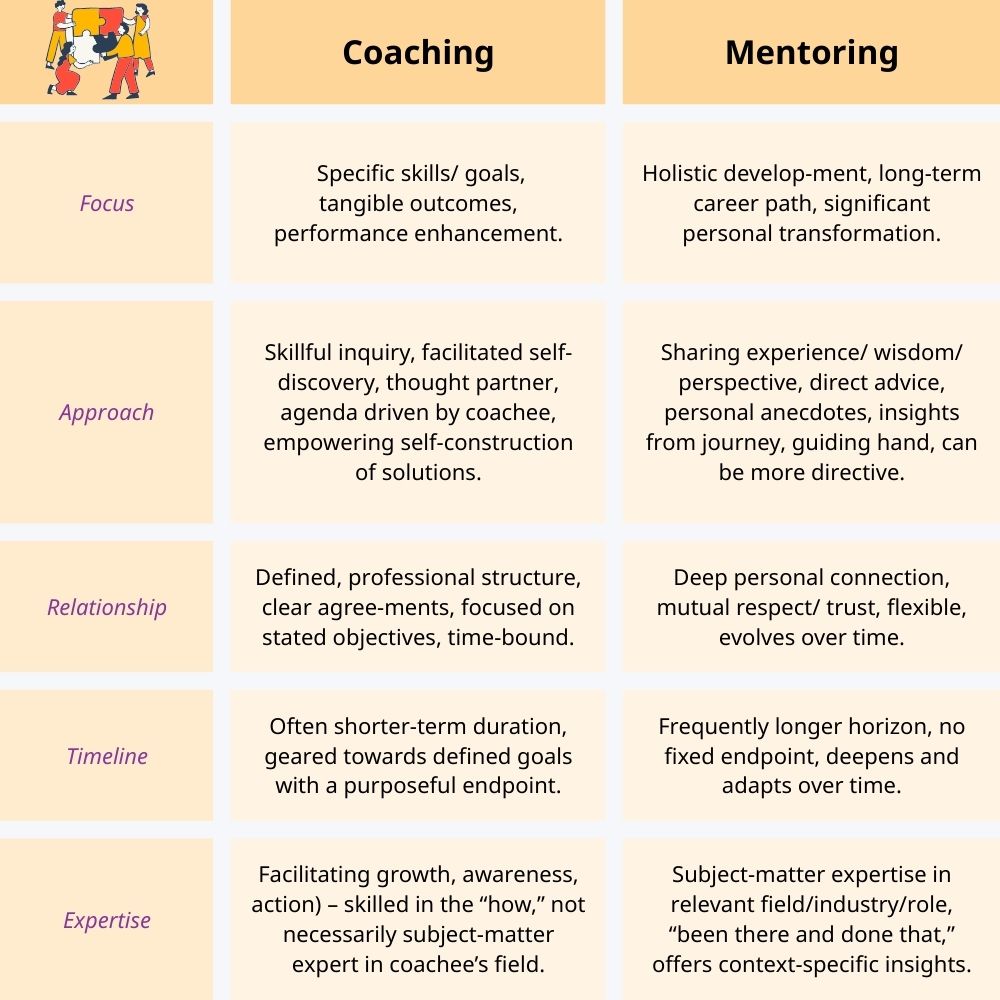Deciding between coaching vs mentoring? This guide clarifies their differences and unique roles in one’s self-discovery journey.
Embarking on a journey of self-discovery is one of life’s most rewarding adventures. As you navigate the path, you might find yourself seeking guidance and support to illuminate the way forward. Two powerful allies often mentioned in this quest are coaching and mentoring. While both offer pathways to transformation and are sometimes spoken of as one and the same, they represent distinct approaches, each with its unique strengths. coaching vs mentoring
Highlights
- Coaching is a collaborative process focused on unlocking an individual’s potential to achieve specific goals through facilitated self-discovery, while mentoring is a relationship-driven journey where a more experienced individual provides guidance, support, and wisdom based on their own experiences for long-term development.
- Key differences between coaching vs mentoring lie in their primary focus and objectives, approach and dynamics, relationship structure, timeline, and the type of expertise leveraged in each practice.
- The choice between coaching and mentoring depends on one’s specific goals, desired support, and timeframe. The former is generally recommended for targeted performance improvement, achieving clear short-to-medium-term goals, overcoming mental blocks, or developing specific skills, while the latter for long-term career guidance, understanding industry landscapes, learning from experience, navigating transitions, or expanding professional networks.
- Coaching and mentoring are not mutually exclusive but rather complementary practices that can work together sequentially or simultaneously, though their core functions remain distinct and not quite interchangeable.
Distilling Coaching and Mentoring
Before we delve deeper into their differences, let us briefly revisit the core essence of each practice.
At its heart, coaching involves a dynamic, collaborative partnership focused on unlocking one’s own innate potential to realize specific goals and enhance performance in particular areas of their work or life.
A coach acts as a skilled facilitator, guiding you through a thought-provoking and creative process. They typically utilize powerful questions and tools to help you discover your own answers, build self-awareness, and develop the strategies needed to move forward effectively. The emphasis is on your agenda and internal resources.
Mentoring, on the other hand, is fundamentally a relationship-driven journey characterized by guidance, support, and long-term development. It typically connects you with a more experienced individual – a trusted advisor and role model – who comes with insights, knowledge, and wisdom to share from their own journey.
The focus is often broader and more holistic than coaching, encompassing career navigation, personal growth, and understanding of a particular field or life path, with the mentor offering advice and sharing from their wellspring of experience.

Coaching vs mentoring
Defining the Differences: A Deeper Dive into Coaching vs Mentoring
The “What”: Primary focus & objectives
- Coaching
Think of coaching when you have a specific peak you want to climb or a particular skill you’re determined to master in a relatively defined timeframe. The focus is on tangible outcomes: enhancing your performance in a current role (e.g., improving your team leadership skills for an upcoming project), achieving clearly defined personal or professional goals (like successfully launching your passion project or preparing for a significant career presentation), or overcoming specific obstacles that are currently hindering your progress (such as building confidence to network more effectively).
It’s about sharpening your abilities and strategies for a particular purpose tied to present or near-future challenges and opportunities.
- Mentoring
Mentoring, in contrast, tends to take a more panoramic view of your life’s landscape. Its focus is generally broader and more encompassing – nurturing your holistic development, helping you navigate the winding roads of your long-term career path, or supporting significant personal transformations over time.
Imagine seeking a mentor to understand the subtle dynamics and unwritten rules of a new industry you’ve entered, to gain wisdom on balancing evolving leadership responsibilities with your core values, or to explore different potential futures for yourself with someone who has broader life experience. It’s about cultivating your inner compass and vision for the longer voyage.
The “How”: Approach & dynamics
- Coaching
The coaching dynamic is one of skillful inquiry and facilitated self-discovery. Your coach acts as a dedicated thought partner, employing powerful, open-ended questions to enable you to delve into your own understanding, unearth your unique solutions, and tap into your inherent strengths.
The agenda is typically driven by you, the coachee; the coach creates the supportive space and structured process for you to explore possibilities and commit to meaningful action. It’s less about being given direct answers and more about being empowered to construct them yourself.
For instance, if you’re feeling overwhelmed by your workload, a coach won’t just prescribe a to-do list; they’ll guide you to reflect on your current habits, clarify your priorities, and design a sustainable time management system that truly works for you.
- Mentoring
The mentoring approach is rooted in the generous sharing of experience, wisdom, and perspective. Your mentor, having navigated similar terrains, will frequently offer direct advice, share personal anecdotes of successes and setbacks, and provide insights gleaned from their own rich journey.
While a mentor certainly listens deeply and can ask guiding questions, they are also there to provide a guiding hand and share what they’ve learned, sometimes taking a more directive stance when appropriate. If you were seeking advice on making a significant career pivot, a mentor might share their own experiences with such a change, discuss potential pitfalls they encountered, and perhaps even suggest contacts or resources that proved invaluable to them. coaching vs mentoring
The relationship itself: Structure & connection
- Coaching
Coaching relationships, while always built on a foundation of trust and strong rapport, tend to operate within a more defined and professional structure. It is common for coaching to be a paid service, with clear agreements from the outset regarding session frequency, duration, confidentiality, and the overall length of the engagement.
The connection is sharply focused on achieving the coachee’s stated objectives. For example, you might engage a leadership coach for a six-month period with bi-weekly sessions specifically aimed at enhancing your strategic thinking and communication skills.
- Mentoring
Mentoring relationships, while they can certainly be part of formal programs with inherent structure, often blossom more organically and are characterized by a deep, personal connection that extends beyond specific, immediate goals. They thrive on mutual respect, trust, and a genuine, often altruistic, interest in the mentee’s overall well-being and growth.
Many mentoring relationships are unpaid and evolve naturally from existing professional or personal connections, offering a degree of flexibility that adapts to the mentee’s changing needs over time. Think of a seasoned professional in your field who takes you under their wing, offering informal advice and encouragement over occasional coffees as you navigate your career.
The timeline: Duration & horizon
- Coaching
Coaching engagements are typically characterized by their specific, often shorter-term, duration. The relationship is usually geared towards achieving a particular goal or a set of clearly defined goals, and once these are demonstrably met, the formal engagement is likely to conclude or is reassessed. It’s somewhat like hiring a specialist for a specific project – their focused expertise is invaluable for that task, and the engagement has a natural, purposeful endpoint.
For instance, an entrepreneur might work intensively with a pitch coach for a few weeks leading up to a critical funding presentation.
- Mentoring
Mentoring relationships frequently unfold over a much longer horizon, sometimes spanning years and evolving through different stages of your life and career. There isn’t always a fixed endpoint; the connection can deepen and adapt as your journey progresses, offering sustained support. It’s more akin to a long-term apprenticeship with a trusted artisan or having a steadfast guide who is there for you through various chapters of your development.
A mentor who advised you on landing your first significant role might still be a cherished confidante when you’re considering senior leadership positions a decade later. coaching vs mentoring
The expertise leveraged
- Coaching
A coach’s primary expertise lies in the process of coaching itself – they are masters of facilitating growth. They are skilled in cultivating awareness, stimulating reflective thinking, asking empowering questions, and championing action – regardless of your specific profession or field.
While many coaches specialize in certain niches (like executive, career, or wellness coaching), their core strength isn’t necessarily having performed your exact job, but in skillfully helping you perform your job, navigate your challenges, or live your life with greater clarity and purpose. You wouldn’t necessarily need your confidence coach to be an expert in software engineering to help you overcome imposter syndrome in your tech role.
- Mentoring
A mentor’s distinctive value is deeply rooted in their direct, lived experience and subject-matter expertise in a particular field, industry, role, or significant life situation that is relevant to you. They have, in essence, ‘been there and done that,’ and are capable of offering rich insights born from practical application, personal triumphs, and learned lessons from real-world challenges. Typically, you seek out a mentor precisely because they have achieved something you aspire to, possess deep contextual knowledge, or have navigated a path you are currently on.
For example, if you’re a first-time manager, a mentor who has successfully led teams for years can offer context-specific advice on people management that a generalist coach might not possess.
| Feature | Coaching | Mentoring |
| Primary Focus | Specific skills/goals, tangible outcomes, performance enhancement in current/near future. | Broader holistic development, long-term career path, significant personal transformation. |
| Approach/Dynamics | Skillful inquiry, facilitated self-discovery, thought partner, agenda driven by coachee, empowering self-construction of solutions. | Sharing experience/wisdom/perspective, direct advice, personal anecdotes, insights from journey, guiding hand, can be more directive. |
| Relationship | Defined, professional structure, often paid service, clear agreements, focused on stated objectives, often time-bound. | Can be formal but often organic, deep personal connection, mutual respect/trust, often unpaid, flexible, evolves over time. |
| Timeline | Typically specific, often shorter-term duration, geared towards achieving defined goals with a purposeful endpoint. | Frequently longer horizon, can span years, no fixed endpoint, deepens and adapts over time. |
| Expertise | Process of coaching (facilitating growth, awareness, action) – skilled in the “how,” not necessarily subject-matter expert in coachee’s field. | Direct lived experience, subject-matter expertise in relevant field/industry/role, “been there and done that,” offers context-specific insights. |
Differences between coaching and mentoring table

Coaching vs mentoring
Read more: Self-coaching – The Art of Being Your Own Coach
When Would You Use Coaching Instead of Mentoring? (and Vice Versa)
Now that we’ve painted a clearer picture of their distinct characteristics, the crucial question becomes: which one is the right fit for you, right now?
The answer lies in the nature of your current goals, the type of support you’re seeking, and the timeframe you have in mind. Let’s look at some common scenarios.
Choose coaching when…
- You’re tackling a specific performance hurdle and need to develop targeted strategies.
Perhaps you’re excelling in many areas but find it consistently challenging to delegate tasks effectively, or you want to significantly enhance your executive presence in high-stakes presentations. A coach will partner with you to explore the underlying factors and co-create actionable steps for measurable improvement in these defined areas.
- You have a clear, short-to-medium-term goal and require a structured approach and accountability to achieve it.
This could range from preparing for a crucial series of job interviews in a new industry within the next three months, to finally writing and publishing your first e-book, or successfully implementing a new company-wide software system. A coach helps you build a focused roadmap, overcome procrastination, and maintain momentum.
- You feel stuck in your current thinking patterns or need to unlock fresh perspectives to solve a pressing problem.
If you’re wrestling with a complex strategic decision, experiencing a persistent creative block in your work, or looking to innovate beyond your usual approaches, a coach may utilize skillful questioning and other proven techniques to help you break through mental barriers, challenge your assumptions, and tap into your own innate resourcefulness, guiding you to your best solution.
- You’re looking to cultivate a specific “soft skill” or leadership competency with actionable feedback.
Whether it’s improving your ability to deliver constructive and motivational feedback to your team, becoming a more active and empathetic listener, or learning to manage interpersonal conflicts with greater confidence and finesse, a coach can provide tailored frameworks, effective tools, and a safe, confidential space to practice and refine these vital skills.
- You desire impartial, expert support and motivation to step decisively outside your comfort zone.
A coach, typically being external to your immediate work environment or personal life, can offer an unbiased viewpoint and the dedicated encouragement needed to take calculated risks, embrace significant changes, and maintain self-belief as you navigate new and demanding challenges.
Choose mentoring when…
- You’re seeking guidance on your long-term career trajectory and holistic professional development.
If you’re pondering questions like, “What kind of legacy do I want to build in my field?” or “How can I cultivate a truly meaningful and impactful career path over the next five to ten years that aligns with my deepest values?”, a mentor can share wisdom gleaned from their own expansive professional and life journey.
- You need to understand the nuanced landscape, culture, and unwritten rules of your industry or a specific organization.
This includes deciphering complex workplace dynamics, navigating “office politics” ethically and effectively, and understanding the broader ecosystem in which you operate – insights that often aren’t found in formal training. A mentor acts as your experienced, trusted guide to this often-uncharted territory.
- You aspire to learn directly from someone’s rich, lived experience and observe a role model in action.
If you deeply admire an individual’s career progression, their authentic leadership style, their unwavering ethical decision-making, their resilience in overcoming significant adversity, or their specific notable achievements, a mentor can offer priceless lessons by sharing their personal story, their decision-making frameworks, and the core principles that have guided them.
- You are navigating a significant professional or personal transition and seek insights and reassurance from someone who has successfully weathered similar changes.
This could be stepping into your first senior leadership position, transitioning between vastly different industries or career types (e.g., corporate to entrepreneurship), or striving to balance demanding professional aspirations with significant life events.
- You aim to thoughtfully expand your professional network and build meaningful, strategic connections within your field through a credible source.
An established and respected mentor can open doors, facilitate valuable introductions, and enable you to build authentic relationships that might otherwise be challenging to access, lending their reputation and insights to support your visibility and growth.
Read more: Accountability Partner – The Secret ‘Weapon’ for Goal Visualization

Coaching vs mentoring
Can Coaching and Mentoring Work Together?
Having explored when to lean towards coaching and when mentoring might be your ideal choice for different aspects of your self-discovery, you might wonder: is it always an either/or decision? And given some overlapping qualities, could these roles perhaps be used interchangeably?
The wonderful news is that coaching and mentoring don’t have to be mutually exclusive. In fact, they are incredibly potent partners, creating a holistic support system that significantly accelerates one’s journey.
Imagine, for instance, a scenario where your long-term mentor, who is guiding you on your overall career advancement within the tech industry, helps you identify that your ability to lead large, cross-functional projects needs significant strengthening to reach the next level. They might then wholeheartedly recommend that you work with a specialist leadership coach for a focused period to build those specific skills and confidence. Conversely, after a successful coaching engagement that helped you clarify your entrepreneurial vision and launch your startup, you might then seek out a mentor – an experienced founder who has scaled multiple businesses – to guide you through the inevitable challenges and opportunities of business growth over the long term.
It’s also increasingly common, and highly effective, for individuals to engage both a coach and a mentor simultaneously. Consider an aspiring author: they might benefit immensely from a mentor (a published author in their genre) who provides insights into the craft of writing, navigating the publishing world, and building an author platform. Concurrently, they could work with a productivity coach to adopt disciplined writing habits, overcome procrastination, and manage the emotional ups and downs of the creative process to meet their manuscript deadlines. The mentor offers wisdom and industry-specific guidance – the ‘what’ and ‘why’ informed by experience – while the coach facilitates the ‘how’ by helping the author tap into their own internal resources and develop effective strategies.
This brings us to the important question of interchangeability. While it’s true that both highly effective coaches and mentors often possess excellent communication skills, are adept at active listening, ask insightful questions, and genuinely care about your development, their fundamental roles, primary objectives, and core methodologies remain distinct – as we explored in detail earlier.
A mentor’s principal offering is their experiential wisdom, domain-specific knowledge, and guidance shaped by their personal journey.
A coach’s principal offering is their process expertise – their ability to facilitate your thinking, unlock your own potential, and help you devise your own solutions, regardless of the specific industry you’re in.
Therefore, while a mentor might occasionally use coaching techniques to help you reflect more deeply, their primary purpose isn’t to be your dedicated process facilitator for every specific skill or goal. Similarly, while a coach might share a brief, relevant personal anecdote to illustrate a concept (though this is generally less central to ‘pure’ coaching models), their role isn’t to be your ongoing source of industry-specific advice or to chart your career path based on their own extensive experiences in that field.
Attempting to make one role fully perform the duties of the other is likely to lead to unmet expectations or a less effective engagement. You wouldn’t typically ask a general fitness coach (focused on your exercise technique and motivation) to provide detailed financial planning advice, nor would you expect your experienced financial advisor (focused on your investment strategy) to design your marathon training schedule. Each professional brings a specialized value.
Read more: 32 Self Discovery Activities for Everyone
Guiding Questions for Choosing Between Coaching vs Mentoring
Below is a list of self-reflection questions for you to decide whether coaching or mentoring is the more aligned choice for your current chapter.
- What is the primary outcome I’m seeking right now?
Am I aiming to master a specific skill (like improving my public speaking), overcome a clearly defined performance challenge (such as meeting sales targets), or achieve a measurable, near-term goal (for example, launching a new website in three months)? This often points towards the focused, goal-oriented nature of coaching.
Or am I seeking broader wisdom, long-term career navigation, holistic personal development, or a deeper understanding of my chosen field or life path (e.g., “How do I build a sustainable and fulfilling career in this industry over the next decade?”)? This suggests the expansive, guidance-rich approach of mentoring might be a better fit.
- What is my ideal timeframe for this support?
Do I need a focused, potentially intensive engagement over a set number of weeks or months to address a current priority or achieve a specific objective? This is often the realm of coaching engagements.
Or am I looking for an ongoing, potentially evolving relationship that can offer guidance, perspective, and support over a more extended period, adapting as my needs and circumstances change? This is more characteristic of a mentoring relationship.
- How do I learn best, and what kind of input do I feel I need most at this moment?
Do I thrive when empowered to explore my own thoughts, uncover my own answers, and build my own strategies from within, with a skilled facilitator guiding my thinking process? This is the heart of the coaching approach.
Or would I benefit more right now from direct advice, shared experiences, practical insights, and actionable wisdom from someone who has already successfully navigated the path I’m on or possesses deep expertise in an area I wish to develop? This aligns with the strengths of mentoring.
- What kind of relationship dynamic am I looking for to support my growth?
Am I seeking a more structured, professional engagement with clear objectives, defined session goals, and regular progress reviews focused on specific outcomes? This is typical of many coaching relationships.
Or would a more informal, personally connected, and organically evolving relationship, perhaps built on shared values and open-ended conversations as needs arise, serve me better? This is often found in mentoring, especially informal mentoring.
Read more: Self-questioning – Why Should We Practice It on a Daily Basis?

Coaching vs mentoring
Final Thoughts
When it comes to coaching vs mentoring, neither approach is inherently superior; their true value is unlocked when they align perfectly with your specific needs at a given time, your immediate goals, and your cherished long-term aspirations. By understanding their distinct characteristics and considering when each shines brightest, you should be better equipped to make an informed and empowered choice!
Other resources you may be interested in:
- 7 Key Coaching Principles for Long Lasting Results
- Coachability: The Secret to Rapid Growth (Plus How to Foster It)
- 11 Best Coaching Books for Transformation & Success
- Situational Coaching Model (SCM): The 6 Paradigms
- Self-leadership: The Art of Leading from Within
Let’s Tread the Path Together, Shall We?


